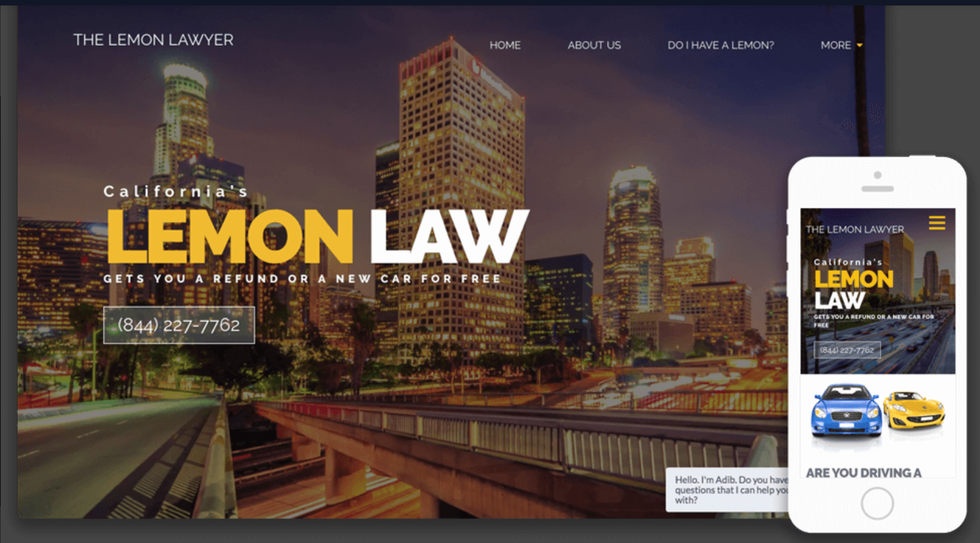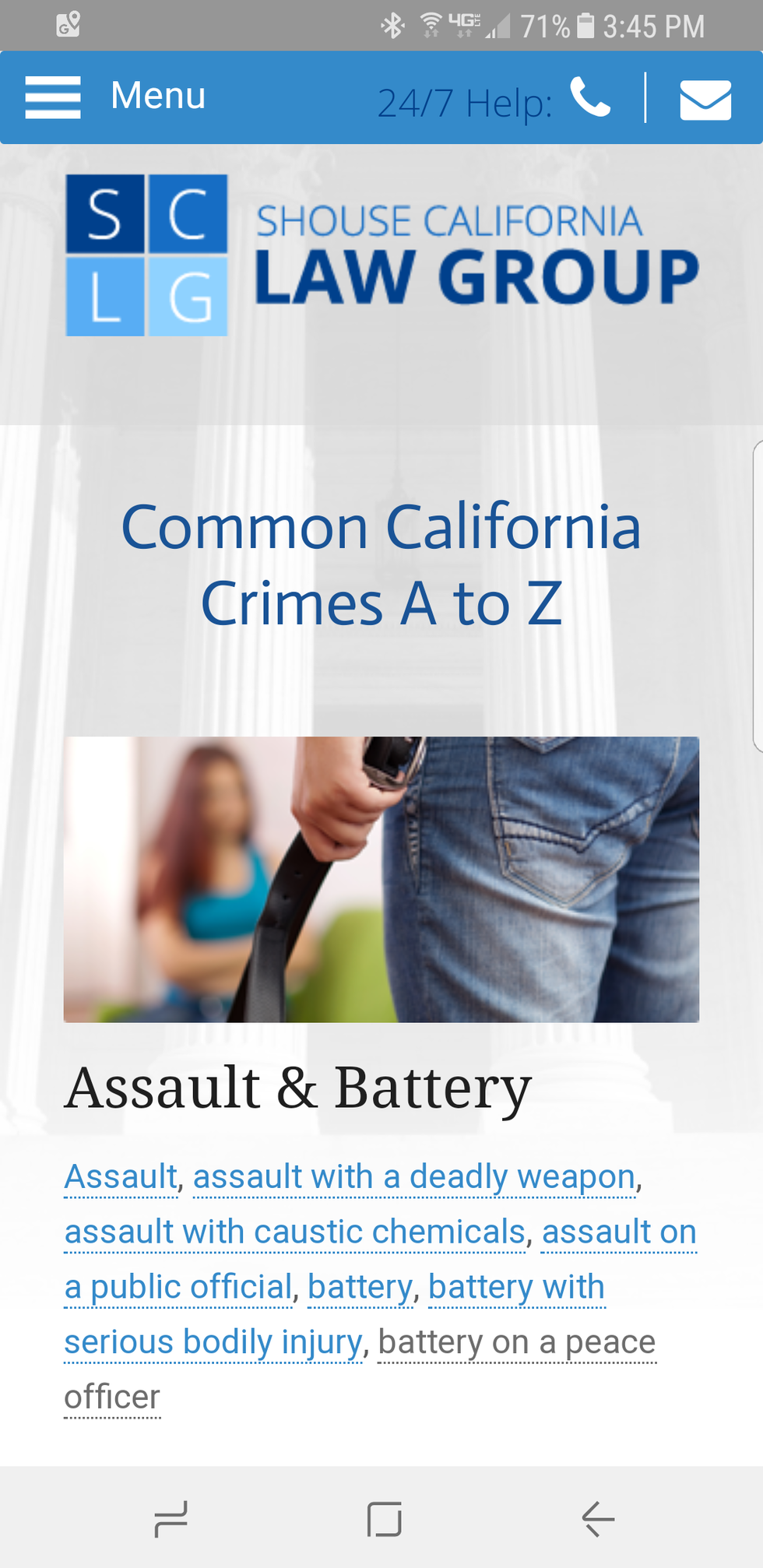Reprinted from Wisconsin Lawyer.

Business was slow at the law firm, the associates were not busy, and the best files were going to a competitor across town. The partners had a vague sense that the firm website wasn't working to generate new business.
I examined it and was struck by how little there was to read on the site. The home page had nothing but moving words like “Trustworthy. Loyal. Helpful. Friendly” – in front of a continuously running animation. The site had been online for four years with virtually no changes. Even the “About Us” had only 175 words, beginning with “Our story began in 1994, when John Doe, Joe Bleaux, and Tim Everyman established the firm….” The site did have a blog, last updated six months earlier, including posts by lawyers who had left the firm.
A search in Google for the partners' primary practice area revealed all their competitors, but not the partners' own firm. Searches in FindLaw and Martindale produced the same results, and a Yelp search turned up a bad review.
This was definitely a law firm website that was not working.
One-third of potential clients begin their search for a lawyer online.1 If your law firm is still operating without a website in the modern internet era, it is likely losing business to firms that put more effort into their online presence. About 70 percent of law firms have generated new cases through their websites, and nearly three-quarters of consumers visit a law firm's website ready to take action.2
Fixing a Website That Is Not Working
A lack of new business is a compelling reason to make a change, but it's important to make sure that you're changing the right things. Unfortunately, lawyers often blame red herrings. For example, a lawyer may decide that her site is failing because it lacks a security certificate, it's loading slowly, or it doesn't have a live chat feature. And when lawyers make changes because of red herrings they end up confused, depleted, and defeated. But this fate is 100 percent preventable when you know the two real causes of website failure.
-
You're Not Attracting Qualified Potential Clients. This happens because the partners bought into the wrong online client acquisition methods, their search engine optimization (SEO) is poor, or both. In all cases, this results in the most viable potential clients finding your competitors' websites before they find yours.
-
Qualified Potential Clients Visit Your Website, But Don't Contact You. If potential clients are not contacting your firm, the problem can almost always be traced to the design of the site, the content on the site, or both.
The common denominator in most poorly performing websites is content. It is the most important part of SEO and part of converting visitors into clients.3
Designs That Don't Work
Your website should represent you well, which means creating both an intellectual and an emotional connection with your potential clients. People don't care how much you know until they know how much you care. These bells and whistles will kill your conversions:
-
Uninstructive animations
-
Image hover effects
-
Fancy fonts
-
Huge fonts
-
Background videos
-
Elaborate menus
-
Jumpy content that flies out
As a result, when people visit your site, they subconsciously associate motion and flashiness with advertisements, which most web users are trained to ignore. They have to work harder to consume the information that they need. They conclude that you're covering up a lack of substance with style.
For example, The Lemon Lawyer's design about California lemon law is simple and can be viewed at a glance. See sidebar: Good Samples of Law Firm Websites.

A custom, novel website design may win awards for the design agency, but this is expensive and is not connected to improving the website conversion rates.
Designs That Work
Put yourself in the shoes of your potential clients. Why are they on your website? Nobody goes to a law firm website to be entertained. They don't want or need to be dazzled. They want information, relief, or at least hope. What does the website need to do to the potential client to cause them to know, trust, and like you?
Give your potential clients the experience they want:
-
A professional-looking site. This rules out do-it-yourself sites such as WordPress, GoDaddy, or Wix.
-
Logical layout and nothing to figure out.
-
Control by the visitor.
-
Easy to navigate and find key information.
-
Easy to read – no moving text, disappearing images, or animated background.
-
Clear calls to action – either completing a web-based form or calling you.
Don't let the sunk-cost fallacy deprive your future clients of your services. Consider the design mistakes of the past to be expensive lessons and make the necessary corrections. That said, there is no reason to spend $10,000 or more for a fancy but ineffective design.
SEO Strategies
The best traffic that you can attract to your website comes from qualified potential clients doing Google or Bing searches about their matter and clicking on the free listings. These potential clients are serious and focused and are often more educated and affluent than potential clients who click on paid advertising. Free search-engine traffic is more cost effective and more sustainable.
The Shouse Law Group site generates substantial business for the firm.

“Unfortunately, attorneys have become the preferred targets for SEO snake oil salesmen for several reasons. 1) Attorneys have money to spend; 2) It's prohibitively expensive for many attorneys to compete using paid advertising; 3) Attorneys are busy and many don't have the time or inclination to learn the basics of SEO that would easily protect them from SEO grift,” says website expert Dan Jaffe, CEO of Lawlytics.com.
SEO drawbacks include the following:
-
Off-site optimization is generally illusory. It's an expensive way for SEO salespeople to say “we're doing things to benefit your site that we can't quantify, prove, or explain.”
-
Paid link-building is ineffective and dangerous, so don't solicit links or offer an exchange of value.
-
Directory links don't move the needle.
-
Keyword optimization is ineffective and dangerous.
-
If SEO sounds like magic, it will eventually hurt you.
Don't try to game the search engines. Their employees have lots of Ph.Ds. and you can't outsmart them. Optimization is generally not an ongoing project. Once it's optimized, a site will stay optimized.
High-quality Content is Key
Consistently world-class SEO has three parts: high-quality content (80 percent) that is well structured (18 percent) and earns quality inbound links (2 percent). Ignore everything else.
Ineffective content 1) talks only about your firm; 2) sounds like advertising; 3) fails to educate or add informational value; 4) doesn't make an emotional connection that inspires potential clients to trust you; 5) tells, but doesn't show, them your expertise; 6) dumbs it down or speaks in generalities; and 7) is written to try to trick search engines.
Marketers can describe you as the “best attorney” in your practice and location and make simple statements like “need a divorce lawyer in Memphis” or “the best personal injury firm in Denver.” The result is tens of thousands of lawyers are all declaring essentially the same thing.
“The content on your website must prove three things to your potential clients. It must show them that you care about them and their goals or plight. It must provide them proof that you've successfully helped people just like them. And it must establish you as an expert,” Jaffe says.
The Keen Law firm emphasizes client satisfaction. See sidebar.
The trick is to write the way your potential clients think. If you pay attention to how your clients talk to you when you meet with them or talk with them on the phone, and observe how they respond to your answers, you'll have a blueprint for what to say and how to say it.
The content on your website must prove:
-
How much you care;
-
That you've helped people just like them; and
-
That you're an expert. Your proof can include:
-
Vivid case studies and results
-
Client recommendations with context
-
Substantive legal pages
-
Timely and insightful blog posts
-
For example, declaring that you were Order of the Coif means absolutely nothing to nearly 100 percent of your potential clients. But, if you explain that you excelled in law school because you had a focused vision and lifelong dream of helping people just like them, it means a lot. If you declare that you have a published court of appeals opinion by listing the citation, it means nothing to most of your potential clients. But if you tell the human story behind the wrong that you righted or the lengths you went in trying, and why you cared passionately about the cause, it means a lot.
If you don't want to write your own content or don't have the time, consider hiring writers who are lawyers.4
Time For a Change
At this point, many lawyers will realize they need a new website company. Remember these points when making a change:
-
Don't get a site built on top of generic platforms like WordPress.
-
Avoid a company that has conflicts of interest – such as selling directory listings or pay-per-click advertising, which puts its law firm customers into competition with each other.
-
Be sure you have total control over the site and can easily add or delete content yourself and rearrange sections easily.
-
Find a company that specializes in websites for lawyers.
-
Avoid money-wasting add-ons like paid social media marketing.
For more, watch “The Safe Way to Change Website Companies.”5
Conclusion
Today is the day you should check to see if your website is working. Are you not getting visits from qualified potential clients? Check by doing a Google search on your top practice area and see what comes up. Are you on page one of Google? Examine the site to see if it has been updated in the last 10 days. (It's true that the more you blog, the more clients you will get.6) Look up the number of page views the site is getting in Google Analytics or your built-in traffic logs.
If potential clients are indeed visiting, are they calling the firm (ask your receptionist) or completing your online form? If not, take a look at the site design – is it busy and moving around and does it resemble an advertisement? Take a close look at the content on the site. Is it boilerplate? Two years old? It should tell stories that cause visitors to know, trust, and like you.
A professionally designed and written website will attract potential clients and cause them to contact you for help. But you'll only know if you check.
Endnotes
1 See https://goo.gl/iSXCze.
2 See https://goo.gl/xee9VK.
3 For more information, watch “Content Creation for Lawyers” at https://goo.gl/yVDF1k.
4 See https://goo.gl/UGJZN1.
5 See https://goo.gl/x4rUdM.
6 See https://goo.gl/GfqJv2.





Comments
There are no comments for this post. Be the first and Add your Comment below.
Leave a Comment